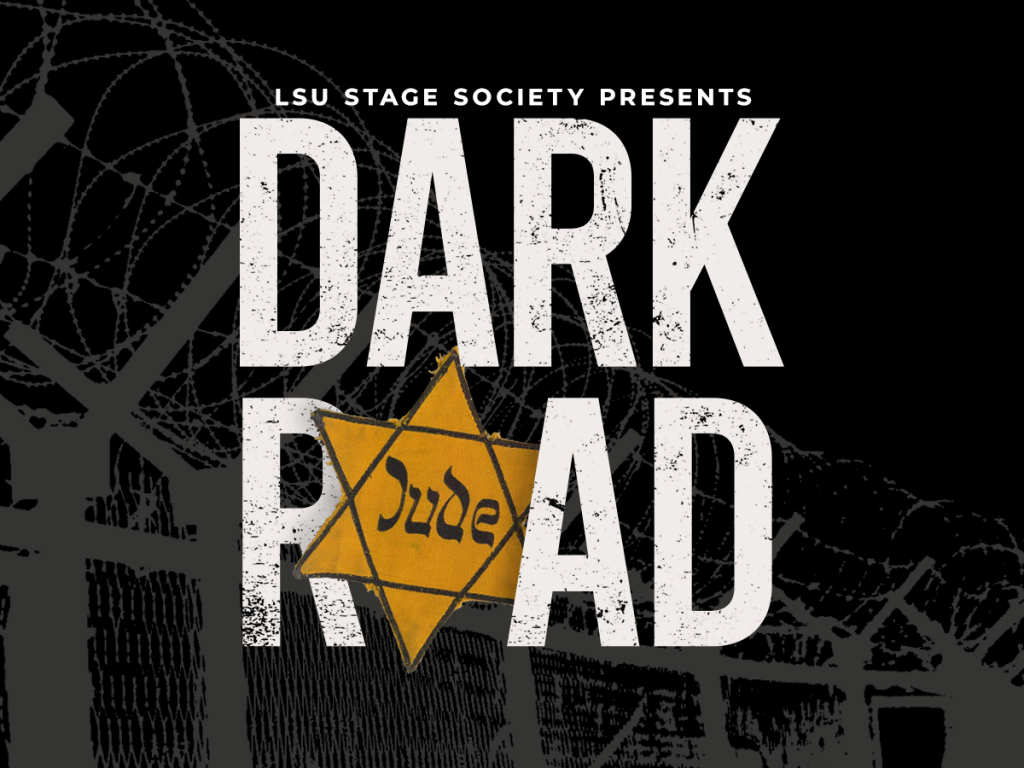Volunteer Label writer Immie Wigfield offers her thoughts on Loughborough Stage Society’s compelling performance of Laura Lundgren Smith’s Dark Road.
People began arriving at 7pm. You could see the nerves on the parents faces as they carried bunches of flowers whilst scrabbling around for their tickets and wondering where the email was sent to. The pressure was on…
Dark Road explores the complexity of power, good and evil and the betrayal of sisters.Greta, a young girl growing up in Nazi Germany, sees the opportunity to find her place in the world and support her sister Lise when she learns that the neighbouring women’s concentration camp is hiring guards. But as she progresses down the dark path laid by the Third Reich, she quickly learns the truth of her obligations. However, her reaction is shocking. She hastily defends her actions, and we see her being dragged into the world of evil. Lise, who is kind-hearted, is horrified by the monster her sister develops into. Despite the fact that the two grow apart, their lives are still intricately and perilously intertwined. She becomes more and more disturbed and eventually this feeling becomes overwhelming. Finally she gives in and ends up in a horrifying and terrifying position.
The portrayal of this shocking and heart-wrenching play was respectfully and sensitively performed by the members of Loughborough Stage Society on the 2nd to the 4th of December. The old-style costumes and perfectly placed set design aided the tense atmosphere, also serving to convey characters personalities; Greta in all black with a long figure-hugging skirt and Lise in a short white dress paired with a white ribbon showing her child like innocence. This dramatic portrayal of the decisions that allow evil to become ordinary captured the audience’s attention from start to finish. All were in shock, some in tears and others had their hands covering their eyes, although a slight parting in their fingers allowed a view to the stage to ensure they didn’t miss anything.
Abbie Walkden, a second-year Sociology student, directed and produced this play herself. She was a part of the Stage Society in her first year taking part in Animal Farm. Being this year’s Media Secretary, her hard work and dedication to the society is recognised. She has had a very busy couple of months, however, she said, ‘it was one of the best things I have ever done’ and that she ‘loved every minute of it and that even through the lows she wouldn’t have changed it for the world’. She confronted any challenges that this project threw at her, including a shuffle of cast members very near to the productions date. Her casting was amazing. Each character choice was faultless, and they all adopted their characters perfectly. When talking to the cast at the end, they all had the same opinion that Abbie was amazing at helping them achieve to the best of their ability.
Greta was excellently portrayed by Elena William. Her rigid character depiction of this women who is being overcome with evil is exceptional. We could see the fight in her eyes and got a fierce sense of inner struggle when the evil is overcoming her soul, especially when in conversation with Daimler, played by the amazing Em Stephenson. Em showed true and raw emotion throughout the whole play and the effect of stuttering her words showed her passion and anger. Phoebe Benson who played Lise perfectly represented the innocence her character is rotated around. Her skipping and slight giggling perfectly showed her childlike nature. However, as her determination grew the complexity of this character developed, and the dramatic plot twist including the juxtaposing sisters, was hard to watch.
This powerful performance was carried all the way to the ending, right to Greta’s last speech. Even though Greta is talking to the audience, the feeling of her talking directly to you is fear-provoking. Elena, staring directly into the audience without breaking eye contact or looking down, played a huge role in captivating the audience, her change in volume emphasising certain phrases stresses the message of the play.
Personally, the scene I found the most effective was when we learn about the child murders. This realisation of how many people this woman murdered and the immense change in her personality from the beginning was suddenly a hugely daunting realisation. The crossover of who was talking, including, Greta, Daimler, and the Commandant, created an almost authoritative atmosphere; you couldn’t pull your eyes away from the characters even if you wanted to. This interactivity between audience and character allowed the viewer to get this sense that you were involved, heightened by how close the audience was sitting to the cast.
Overall, this play was outstanding. All elements came together faultlessly and the overall effect this had on the audience was incredible, with all believing that ‘it did the story justice, and the acting from Greta was truly convincing’. The play was continuously shocking, with each scene revealing another painful portrayal of the truth about these awful Nazi Germany camps.
Edited by Izzie Naish – Editor in Chief
Header designed by Sarim Mangi – Head of Design


